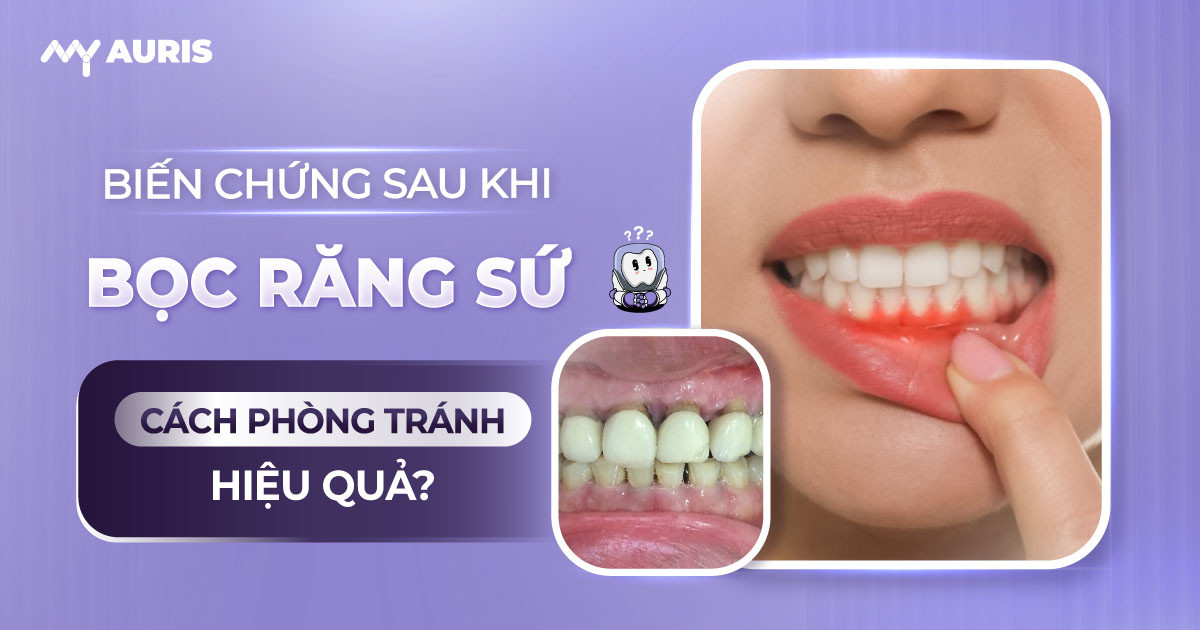Ceramic dental crowns are a popular cosmetic restoration method, helping to improve the smile and chewing function. However, porcelain crowns pose a potential risk of complications if not performed with the correct technique or improper care. This article will analyze common complications after porcelain crowns, their causes and effective ways to prevent them. At the same time, we also mention serious complications, treatment methods and related costs.
Complications after porcelain crowns
Ceramic crowns are the solution Restoring teeth, improving oral health, bringing a beautiful and natural smile. However, like any dental surgery, porcelain crowns also have the potential for complications. Understanding the complications after porcelain crowns, their causes and prevention helps you protect your health and have a safe and effective porcelain crown experience.
Tooth pain and sensitivity
Can complications after porcelain crowns cause pain? Absolutely possible. After getting porcelain crowns, you may experience toothache and sensitivity. This condition is usually normal in the first few days.
Cause:
- Abrasion teeth to place ceramic crowns
- Size mismatched ceramic crown
- Ceramic teeth cause gum irritation
| Pain Relief Measures | When to see a doctor |
|---|---|
| Use pain relievers as prescribed by the dentist | Severe and lingering pain long |
| Apply a cold compress to the outside of the cheek to reduce pain and swelling | Sensitivity that does not subside after a few days |
| Avoid eating foods that are too hot, too cold, or hard | A fever or swelling of the face |

Gingivitis
Gingivitis is a complication common after porcelain crowns.
The causes leading to complications after porcelain crowns are what? For gingivitis, the cause may be:
- Ill-fitting ceramic crowns cause food accumulation
- Material ceramic crowns cause irritation to gums
- Poor Oral HygienePoor
| Oral Care Measures | When to See a Doctor |
|---|---|
| Good oral hygiene bisexual: – Brush your teeth at least twice a day. – Use toothpaste containing Fluoride. – Brush your teeth properly and gently. |
Swollen, red and bleeding gums: – Could be a sign of gingivitis. – Need to be examined and treated promptly by a doctor. |
| Use dental floss to clean between teeth: – Remove plaque and leftover food from between teeth. – Prevent tooth decay and gingivitis. |
Prolonged bad breath: – Can be due to many reasons, including dental disease. – The doctor will diagnose and provide appropriate treatment. |
| Gargle with warm salt water: – Helps disinfect and soothe gums. – Supports the treatment of gingivitis and mouth ulcers. |
Gums recede, exposing tooth roots: – Causes sensitivity and discomfort. – The doctor will evaluate the level of gum recession and recommend treatment (for example, gum grafting). |
Bad breath
Bad breath after porcelain crowns can be due to tooth hygiene mouth is poor or the porcelain crown does not fit tightly, creating conditions for bacteria to grow. The most effective way to prevent complications after porcelain crowns? Pay attention to oral hygiene.
| Care Measures | Frequency | When to See a Doctor Doctor |
|---|---|---|
| Brush your teeth | At least twice a day | |
| Use dental floss | Every day | |
| Rinse your mouth with antiseptic mouthwash | Every day day | |
| Prolonged bad breath | ||
| Unusual bad odor |
 Broken or chipped porcelain teeth
Broken or chipped porcelain teeth
Even though porcelain teeth have good durability, they can still be broken or chipped due to strong chewing force, trauma or poor quality porcelain crowns.
| Care Measures | When to see a doctor |
|---|---|
| Avoid eating foods that are too hard | Broken porcelain teeth or chipped teeth |
| Protect your teeth when playing sports | Feeling uncomfortable when chewing |
| Choose a reputable dental facility |
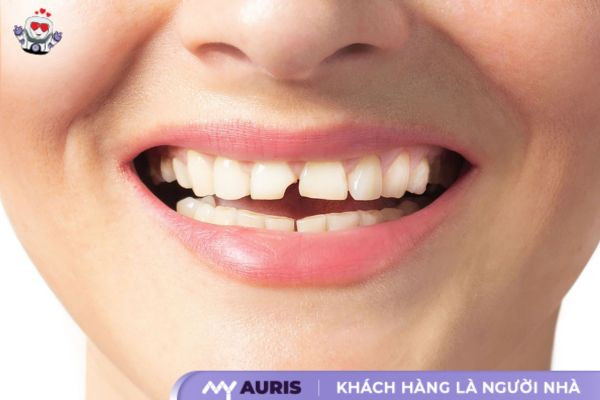
Falling porcelain teeth
Falling porcelain teeth may be due to unstable porcelain crowns, strong chewing force or material poor cement quality.
| Prevention Measures | When to See a Doctor |
|---|---|
| Avoid chewing foods that are too tough or hard | Loose porcelain teeth |
| Choosing a dentist have experience with porcelain crowns without complications | Porcelain teeth peel off |
| Regular dental check-ups |
Causes of complications when wearing porcelain crowns
Ceramic crowns are a popular tooth restoration solution, bringing a confident and radiant smile. However, complications after porcelain crowns can occur, affecting the patient’s oral health and psychology. “Can complications after porcelain crowns cause pain?”, “What are the causes of complications after porcelain crowns?”, “What is the most effective way to prevent complications after porcelain crowns?”, “How much does it cost to treat complications after porcelain crowns?”… are common questions of many people.
Understand the causes of complications. is the first step to prevention and effective treatment. Here are some common causes:
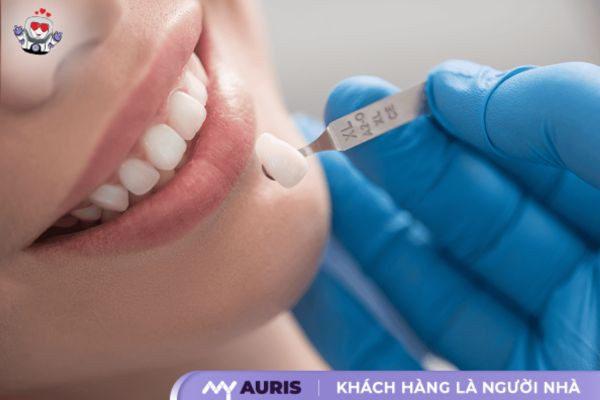
Improper porcelain crown technique: The source of all problems
Tooth crown technique plays a decisive role in the success and longevity of porcelain teeth. Some common errors include:
- Taking tooth impressions incorrectly: Leads to porcelain teeth not fitting tightly to the tooth pulp, creating gaps for bacteria to enter, causing gingivitis, bad breath, and even pulpitis.
- Excessive grinding of teeth: Weakens teeth, increases risk of fracture, broken, sensitive, affecting the tooth pulp.
- Ceramic tooth attachment is not secure: Porcelain teeth easily peel off, creating conditions for bacteria to grow.
Poor quality of porcelain teeth: “Money is lost”
The quality of porcelain teeth directly affects aesthetics, durability, bearing capacity and biological compatibility in the oral environment.
- Poor quality porcelain teeth: Often have unnatural colors, shapes, and sizes, easily become yellow, dull, and cause loss of aesthetics.
- Poor durability: Easily cracked, chipped, broken when chewing, especially with hard foods.
- Ceramic teeth of unknown origin: May contain toxic ingredients, cause gum irritation, and affect health.
Improper oral care: “Prevention is better than cure”
Poor oral care creates conditions for bacteria to grow, causing many dental diseases. mouth, affecting the longevity of porcelain teeth:
- Inadequate oral hygiene: Accumulation of plaque, tartar, causing gingivitis, bad breath, and yellowing of porcelain teeth.
- Uneven chewing force: Eating food that is too hard, chewy, biting hard objects… causes porcelain teeth to chip or break.
- Not having regular check-ups: Missing the opportunity to detect and treat potential problems early hide.
Dental condition before porcelain crown: A solid foundation for durable porcelain teeth beautiful
Initial dental condition greatly affects the results of porcelain crowns to: Bacteria continue to grow underneath porcelain teeth, causing inflammation, pain, and even abscesses.
Porcelain crowns are a cosmetic solution effective for beautiful and natural teeth. However, porcelain crowns have potential risks. Can complications after porcelain crowns cause pain? What are the causes of complications after porcelain crowns? These are common questions. Choosing a reputable dentist and clinic is an important first step, determining the success of porcelain crowns. Proper oral care after porcelain crowns plays a key role in preventing complications, maintaining beautiful porcelain teeth and prolonging life. Complying with the dentist’s instructions after porcelain crowns is extremely important, ensuring the healing process takes place normally. and minimize complications. Regularly checking your teeth after porcelain crowns helps you monitor your oral health, detect potential problems early and take timely interventions. Porcelain crowns are a tooth restoration solution chosen by many people because of their high aesthetics, bringing a beautiful and natural smile. However, if the technique is not performed properly or if care is not taken properly after porcelain coating, it can lead to complications. Some common complications after porcelain crowns include toothache, gingivitis, bad breath, broken porcelain teeth, and peeling porcelain teeth. More seriously, complications can affect long-term oral health, even endangering general health. So what are the serious complications after porcelain crowns? Pulpitis is an inflammation that occurs in the soft tissue inside the tooth, where nerves and blood vessels are located. This is a serious complication, causing severe pain, greatly affecting activities and quality of life. So what is the cause of pulpitis after porcelain crowns? Some common causes include: Symptoms of pulpitis: If you experience this If you have the above symptoms, you should immediately go to a reputable dental clinic for timely examination and treatment by a doctor. Timely dental treatment will help control infection and prevent dangerous complications such as tooth abscess or tooth loss. Tooth abscess is a condition where inflammation spreads from the tooth pulp to the tissues surrounding the tooth root, forming a pus pocket. This is a dangerous complication, which can cause many other serious complications if not treated promptly. Some causes leading to abscesses tooth:How to prevent complications after porcelain crowns
Choose a reputable dentist and clinic

Proper oral care

Follow the dentist’s instructions
Regularly check teeth
Early detection of Complications: Through examination and X-rays, the dentist can early detect potential Complications such as Gingivitis,Serious Complications After Porcelain Crowns
Pulpitis
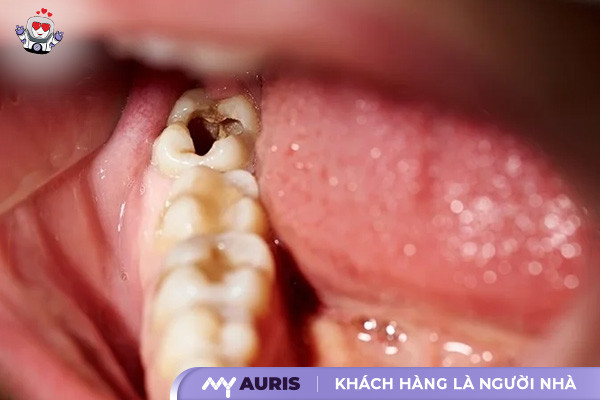
Tooth Abscess
Tooth abscess symptoms:
- Severe pain at the site of the abscess .
- Swelling of the corresponding cheek or jaw area.
- Red, swollen gums, painful to the touch.
- Appearance of white pustules in the gums.
- Bad breath.
- Fever, fatigue, loss of appetite.
Treatment of tooth abscess usually includes:
- Pustule drainage: The doctor will make a small incision on the gum to drain the pus out.
- Root treatment: If the abscess originates from pulpitis, the doctor will perform root canal treatment.
- Prescription medication: Including pain relievers, antibiotics, anti-inflammatories,…
Prevention of tooth abscess:
- Oral hygiene properly: Brush your teeth at least twice a day, use dental floss to clean between teeth.
- Regular dental check-ups every 6 months to detect and promptly treat dental problems.
- Supplement complete nutrition, strengthen the body’s resistance.
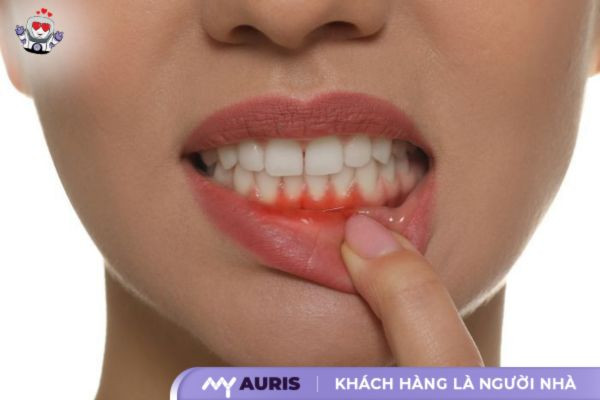
Jaw Fractures & Neuropathic Pain: Rare But Extremely Dangerous Complications
Although more rare, jaw fractures and neuropathic pain are extremely dangerous complications after wrapping porcelain teeth.
Jaw bone fractures can occur due to:
- Strong impact force during tooth grinding or porcelain tooth installation.
- Weak jaw bone due to disease or aging.
Nerve pain is a rare complication, usually caused by damaged nerves during the process of grinding teeth or installing porcelain teeth. Neuropathic pain can cause severe, long-lasting pain and seriously affect quality of life.
Prevention of jaw fractures and neuropathic pain:
- Choose a reputable dental clinic with highly qualified and experienced doctors.
- Perform X-rays before getting porcelain crowns to evaluate the condition of the jawbone and nerves.
- Strictly follow the care instructions after getting porcelain crownsof the doctor.
Complications after porcelain crowns are something no one wants. However, if you are fully equipped with knowledge and choose a reputable dental facility, you can absolutely have a radiant and healthy smile with porcelain teeth.
Treatment of Complications After Porcelain Crowns
Porcelain dental crowns are a solution to restore aesthetics and function for damaged teeth, bringing a confident and radiant smile. However, in some cases, complications after porcelain crowns may occur, affecting the patient’s dental and psychological health.

Medical Treatment
Medical treatment is often applied for mild complications that do not cause serious damage to teeth, gums and jawbone. This method focuses on pain relief, anti-inflammation and infection control.
Under the direction of your dentist, you may be prescribed some of the following medications:
- Pain reliever: Reduces pain and sensitivity caused by gingivitis, porcelain teeth rubbing against the gums or surrounding soft tissues.
- Anti-inflammatory drugs: Control inflammation, reduce pain and swelling, and prevent widespread complications.
- Antibiotics: Indicated in cases of gum infection, pulpitis or tooth abscess.
In addition to taking medication, you need to closely follow your dentist’s instructions on oral hygiene, diet and lifestyle to achieve the best treatment effect.
Dental Treatment
When complications become more severe, dental treatment will be applied to overcome the current situation and prevent recurrence of complications. Depending on the severity and location of the damage, the dentist will recommend a suitable treatment regimen:
- Gum removal and oral hygiene: Removes bacteria and plaque buildup, helps gums recover and prevents infection.
- Root treatment: Applied when complications cause pulpitis. The dentist will remove the infected pulp, clean the root canal and fill it to protect the tooth.
- Remove and rebuild porcelain teeth: In case the porcelain teeth are damaged and no longer fit tightly, the dentist will remove the old porcelain teeth, thoroughly treat the cause of complications and proceed to rebuild new porcelain teeth.
ThingsDental treatment requires high technique and expertise. Therefore, you should choose a reputable dentist and dental clinic with modern equipment to ensure safety and treatment effectiveness.
Dental Surgery
Dental surgery is the final treatment method, indicated in cases of serious complications and adverse effects. to the jaw bone structure and surrounding tissues.
- Maxillary sinus lift: Performed when teeth have been missing for a long time, jaw bone loss makes implant placement difficult.
- Bone graft: Adds bone to the bone loss area, creating favorable conditions for placing implants or tooth restoration.
Dental surgery is a form of minor surgery, requiring the doctor performing it to be highly specialized and experienced. You should choose a reputable hospital or dental clinic, fully equipped with modern medical equipment to ensure safety and the best treatment results.
Costs for treating complications after porcelain crowns
Ceramic dental crowns are a solution to help improve aesthetics and oral health. However, complications after porcelain crowns may arise, leading to financial problems for treatment.

Factors affecting cost
The cost of treating complications after porcelain crowns is not fixed, depending on many factors:
- Severity of complications: Mild complications such as pain and gingivitis often have lower treatment costs than severe complications such as pulpitis and jaw fracture.
- Treatment methods: Basic dental treatment (fillings, scaling) costs less than dental surgery (tooth extraction, bone grafting).
- Type of material used: High-end materials often come at a higher cost.
- Reputation of the dentist and medical facility: Good, experienced dentists and reputable medical facilities often have higher fees.
Average cost
Because it depends on many factors. Factors and costs for treating complications after porcelain crowns are very diverse.
- Medical treatment: ThPain relievers and anti-inflammatories: from a few hundred thousand dong.
- Dental treatment: Scaling, tooth filling: from several hundred thousand to several million dong.
- Dental surgery: Tooth extraction, bone grafting: from several million to several tens of millions of dong.
Dental insurance
Dental insurance can support the cost of treating complications after porcelain crowns, reducing your financial burden. However, the level of coverage depends on the insurance package you participate in.
Advice:
- Choose a reputable medical facility and good dentist to minimize the risk of complications.
- Proper oral care, following your dentist’s instructions.
- Learn carefully about dental insurance to get support when needed.
Ceramic dental crowns are an effective solution to restore aesthetics and tooth function. However, like any medical procedure, porcelain crowns also carry potential risks of complications. Understanding possible complications, their causes and how to prevent them is extremely important. Don’t hesitate to contact My Auris Dental for detailed advice and answers to any questions about porcelain crown services.
Thu Lieu


